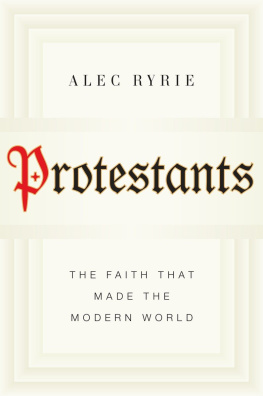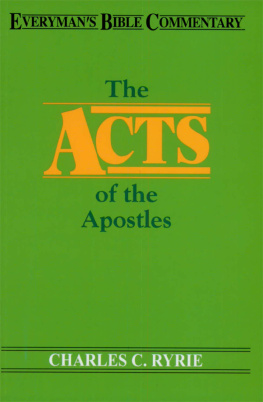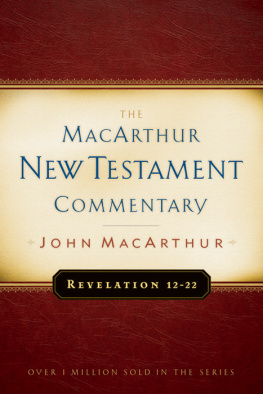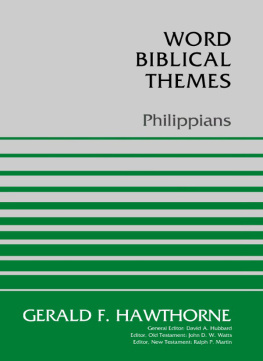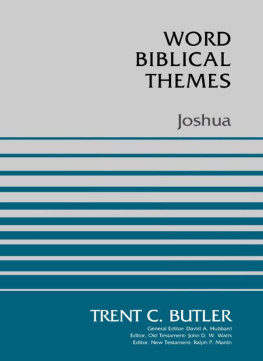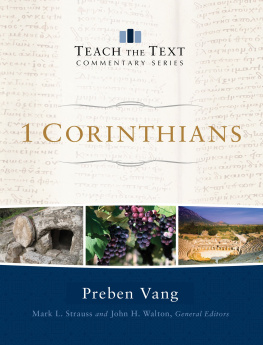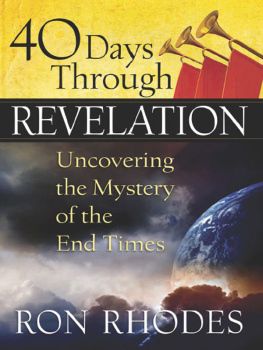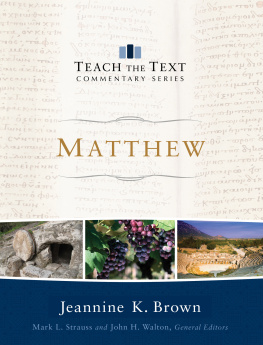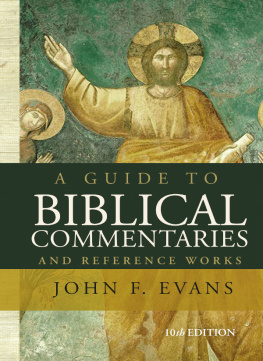Ryrie - Revelation
Here you can read online Ryrie - Revelation full text of the book (entire story) in english for free. Download pdf and epub, get meaning, cover and reviews about this ebook. City: Chicago, year: 1996;2011, publisher: Moody Publishers;Moody Press, genre: Religion. Description of the work, (preface) as well as reviews are available. Best literature library LitArk.com created for fans of good reading and offers a wide selection of genres:
Romance novel
Science fiction
Adventure
Detective
Science
History
Home and family
Prose
Art
Politics
Computer
Non-fiction
Religion
Business
Children
Humor
Choose a favorite category and find really read worthwhile books. Enjoy immersion in the world of imagination, feel the emotions of the characters or learn something new for yourself, make an fascinating discovery.
- Book:Revelation
- Author:
- Publisher:Moody Publishers;Moody Press
- Genre:
- Year:1996;2011
- City:Chicago
- Rating:4 / 5
- Favourites:Add to favourites
- Your mark:
- 80
- 1
- 2
- 3
- 4
- 5
Revelation: summary, description and annotation
We offer to read an annotation, description, summary or preface (depends on what the author of the book "Revelation" wrote himself). If you haven't found the necessary information about the book — write in the comments, we will try to find it.
Designed for laypeople, these commentaries deal seriously with the biblical text without being overly technical. Introductory information, doctrinal themes, problem passages, and practical applications are examined.
Revelation — read online for free the complete book (whole text) full work
Below is the text of the book, divided by pages. System saving the place of the last page read, allows you to conveniently read the book "Revelation" online for free, without having to search again every time where you left off. Put a bookmark, and you can go to the page where you finished reading at any time.
Font size:
Interval:
Bookmark:


1996 by
CHARI IS C. RYRIE
All rights reserved. No part of this book may be reproduced in any form without permission in writing from the publisher, except in the case of brief quotations embodied in critical articles or reviews.
[All Scripture quotations are taken from the New American Standard Bible, Copyright 1960. 1962. 1963. 1968. 1971. 1972. 1973. 1975. 1977 by The Lockman Foundation. Used by permission. (www.Lockman.org)
ISBN: 0-8024-7108-0
ISBN-13: 978-0-8024-7108-6
We hope you enjoy this book from Moody Publishers. Our goal is to provide high-quality. thought-provoking books and products that connect truth to your real needs and challenges. For more information on other books and products written and produced from a biblical perspective, go to www.moodypublishers.com or write to:
Moody Publishers
820 N. LaSalle Boulevard
Chicago, IL 60610
10
Printed in the United States of America
SECTION 1:
THE THINGS WHICH YOU HAVE SEEN, 1:920
SECTION 2:
THE THINGS WHICH ARE, 2:13:22
SECTION 3:
THE THINGS WHICH SHALL TAKE PLACE, 4:122:21
E ach book of the Bible is important, but the last book has the added significance of being the consummation and climax of God's revelation. The book of Revelation is especially significant because it concerns things which must soon take place. We would not know many of these things if the book of Revelation were not in the Bible. It is the major (but not the only) prophetic book in the New Testament. John was commanded not to seal the book (22:10), and those who read it are promised a special blessing (1:3). Apparently, therefore, the book was expected to be understandable and helpful to those who read it. It is an apocalypse (literally, a revelation), designed not to mystify but to clarify.
According to the book itself, the author's name was John (1:4, 9; 22:8), who was a prophet (22:9). He was a leader in the churches of Asia Minor (chaps. 23) and was one of the earliest disciples of the Lord. He was the son of Zebedee, and his family were prosperous fishermen (Matt. 4:21). He, along with James and Peter, had a special relationship with the Lord (Mark 5:37; 13:3). John is mentioned only three times in the book of Acts (3:1; 4:13; 8:14), and tradition says that he settled in Ephesus, where he was later arrested and banished under the Emperor Domitian reigned from A.D. 8196, and since Irenaeus's testimony that John wrote Revelation while on Patmos is confirmed by other early writers, the book is apparently one of the last written of the New Testament. This late date (in the 90s) is also confirmed by the picture of complacency and defection in the churches in chapters 2 and 3. This fact presupposes that a second generation of Christians had already come on the scene who did not hold the same convictions as their fathers. That the style of Revelation is different from the Gospel and the three letters of John is no proof that Revelation was written by a different John. The nature of the material in Revelation and the fact that it was given in a vision can easily account for the differences in style.
The book is a revelation of things that must soon take place. The understanding of when the events of the book come to pass marks the difference between the various schools of interpretation.
Preterist is from a Latin word that means past. Thus the preterist interpreters are those who see Revelation as having already been fulfilled in the early centuries of the church. Chapters 511 are said to record the church's victory over Judaism; chapters 1219, her victory over pagan Rome; and chapters 2022, her glory because of these victories. The persecutions described are those of Nero and Domitian, and the entire book was fulfilled by the time of Constantine (A.D. 312).
The historical or continuous-historical interpretive viewpoint states that in Revelation there is a panorama of the history of the church from the days of John to the end of the age. It holds that the book has been in the process of being fulfilled throughout the whole Christian era. Those who hold to this view see in the symbols the rise of the papacy, the corruption of the church, and various wars throughout church history. Most of the Reformers interpreted the book in this manner, but everyone's interpretation within this viewpoint is a scheme all its own. There is no uniformity of details; indeed, dogmatism and contradiction abound among those who attempt to interpret the book in this way.
The idealist approach sees in Revelation a pictorial unfolding of great principles in constant conflict. The book does not record actual events that have been fulfilled or that are going to happen; rather, it merely portrays the age-long struggle between good and evil. This viewpoint spiritualizes and allegorizes the text.
The label futurist is derived from the fact that this interpretation sees the book from chapter 4 to the end as yet to be fulfilled. If one follows the plain, literal, or normal principle of interpretation, one concludes that most of the book describes what is yet future. No judgments in history have ever equaled those described in chapters 6, 8, 9, and 16. The resurrections and judgment described in chapter 20 have not yet occurred. There has been no visible return of Christ as portrayed in chapter 19.
The concept of a literal interpretation raises questions for some, since it seems to preclude anything symbolic, and the book obviously contains symbols. Perhaps saying normal or plain would be better than literal, since futurists do recognize the use of symbols in the book. The difference between the literalist and the spiritualizer is simply that the former sees the symbols as conveying a plain meaning. All recognize the presence of symbols in the Bible. Note, for instance, Psalm 22. Verse 18 prophesied the casting of lots for Christ's garments. This was a literal statement. Verses 12 and 13 depict the fierce enemies of the Lord as strong bulls and ravening lions. These are symbols with a very plain meaning.
Revelation 8:12 prophesies a judgment that will affect the sun, moon, stars, day, and night. Apparently the stars are the literal astronomical bodies in the heavens. In 9:12 John records seeing a star fall from heaven. This is a plain symbol, and one that is interpreted in the text itself as indicating a created being (probably an angel). The English word star is used today in both a literal and symbolic manner, just as it is in Revelation 8 and 9. We speak literally of the stars in the heavens. We also refer to stars on the athletic field or in the entertainment industry, and in so doing we are using a symbol with a very plain meaning. Indeed, symbols often make the meaning more plain.
Futurists do not deny the presence of symbols in the book, nor do they claim to be able to explain every detail with certainty. But they do insist that the principle of plain interpretation be followed consistently throughout the book.
In interpreting this book it is also important to remember that John often was shown things he struggled to describe in earthly language. Therefore, he says something is like something else (as, e.g., in his description of the risen Christ in 1:1316 and the appearances of the locusts in 9:710). Or he will use as to try to best convey what he saw or heard (e.g., 6:1213). Both words are used together in 13:11. But when he does not use these words, we are to understand that whatever he is describing is exactly what he saw or heard.
Font size:
Interval:
Bookmark:
Similar books «Revelation»
Look at similar books to Revelation. We have selected literature similar in name and meaning in the hope of providing readers with more options to find new, interesting, not yet read works.
Discussion, reviews of the book Revelation and just readers' own opinions. Leave your comments, write what you think about the work, its meaning or the main characters. Specify what exactly you liked and what you didn't like, and why you think so.


